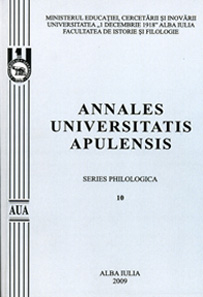ÎNTRE HAR ŞI DAR… CE MĂ FAC? SUNT DEBUTANT!
Between Talent and Gift - What Do I Have to Do? I am a Beginner!
Author(s): Marcela CiorteaSubject(s): Cultural Essay, Political Essay, Societal Essay
Published by: Universitatea »1 Decembrie 1918« Alba Iulia
Keywords: competences; formation; information; reformation; performance
Summary/Abstract: At the millenniums′ crossroads, not only the science evolution but also the informational explosion of the technological era seems to have turned upside down education everywhere. Therefore, and the thing is both accepted and denied by the specialists, the stress is put mainly on the informative side, understood as a ready made knowledge passed from the front desk to the student. On the other hand, a new direction is developing, that, perceiving the lost in the formative side of education, is giving way to desperate calls to return to role-models, humanism and culture. Here we are standing, in front of a terms oposition of artificiallly created terms, as long as a simple look up in the dictionary explains the fact formation and information are two terms which seem to complete eacherther than to exclud one another. And because, as the historian used to say, anything must have a beginning in order to be understood, we put aside our dictionaries′ explinations, which do confirm our theory, and we exemplify the basic senses of the words in Latin, linking them to their lexical family. Consequently we can see that, both in Latin and in Romanian the formation semantics and its family gravitate to the ethimome forma, although, in time, there have been some enstarngements from and variations on the same theme. It is widely known that each DEX entry esteblishes, generally at least, a possible ethimology, as we could see here including French. In addition to this we have to say that we are intrested in the formation only from a pedagogical point of view, what in English is called training and in French … formation! Furthermore, the two reasons we are linking this to the French dictionary, is that when we borrow or calk a certain term, we must take into account the variety of meanings of its language of origin. What do we observe as a result of this selection? Formation means information. And vice versa! There cannot be formation without information. And neither vice versa! Formation does not appear chaotically, but presupposes a preplanning, an organization of ideas, of knowledge, an affective participation, firstly due to personal information, of your own imagination, creativity, to build a convincing presentation, in favour of the advanced proposals. Formation also means conformation, information, performance, reformation, transformation; it is not a unilateral action, from the formatter to the formed, but a bilateral one, reciprocal, focused on both implicated actors. We aren’t taking into account the qualities that the formatter must have, the competences, the abilities, talent and haw prepared he is; we are content with the underlining of the two Latin meanings which, in the modern languages seem to be lost: that of creator and that of author. Truly, we do not think of it as a real lost but more a subscription of the meanings which we consider when we speak of an educator.
Journal: Annales Universitatis Apulensis. Series Philologica
- Issue Year: 11/2010
- Issue No: 1
- Page Range: 288-300
- Page Count: 13
- Language: Romanian

